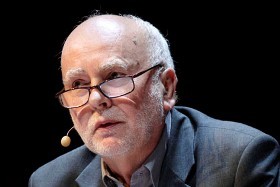Conference
Part I. The Classics, Art, and Kitsch -
11 November 2006
09.30 – 18.30
Passenger Terminal, Amsterdam
Towards a Definition of Western Culture
This conference marks the beginning of a quest for a new definition of Western culture by inquiring into the meaning of the classics, of art, and of the phenomenon of kitsch.
‘Beauty will save the world’, Dostoyevsky provocatively stated in The Idiot. But who could endorse this view today? There is no culture without art – but what position does art occupy in our twenty-first-century society? Any ‘elitist’ form of cultural expression is labeled antidemocratic, and for that reason alone instantly condemned. Is there actually any fundamental difference between ‘high’ and ‘low’ art, or are they merely social constructs which reflect different tastes? Is great, high art, art which seeks to endure, still possible in our times?
‘It aims at pleasure without any thought of the best.’ In this way, Socrates defined a concept which twenty-five centuries later was to begin its relentless advance: kitsch. Where kitsch rules, everything is lovely, delightful, and good fun. Kitsch is the heart and soul of ‘postculture’: nothing is difficult in this culture, everything is immediately accessible to everyone, we no longer have to make any effort, everything is recognisable and, above all, possesses that ‘feel-good’ factor! Which values are propagated by kitsch? If kitsch is not ‘real’, then what is? Where can we find that which is really true, good, and beautiful?
Speakers

Marc Fumaroli

Hans Abbing

Sidney Blumenthal

Iwona Blazwick

Roberto Calasso

Antoine Compagnon

Marlene Dumas

Paul Gilroy

Arnon Grunberg

Karsten Harries

Hendrik Hertzberg

Menno Meyjes

Jack Miles

Alexander Nehamas

Ingrid Rowland

Roger Scruton

Markus Stenz

Jonathan Taplin

Chuck Workman
